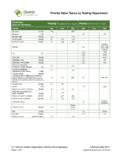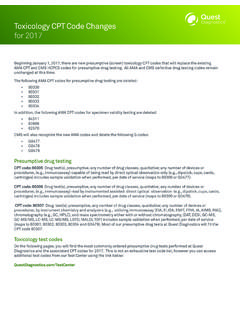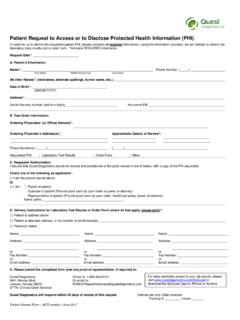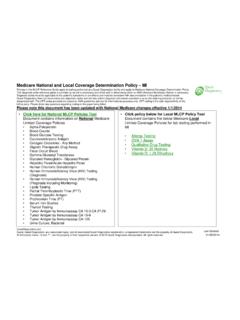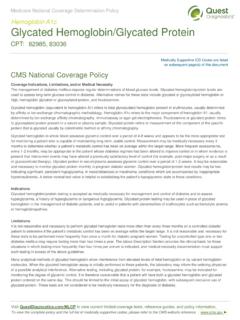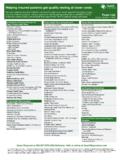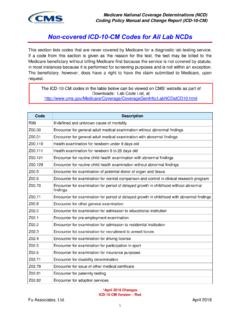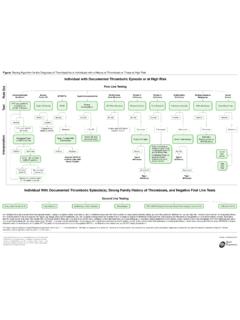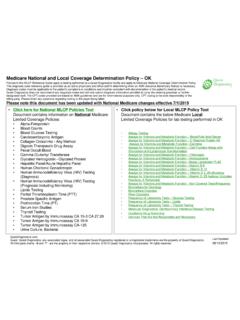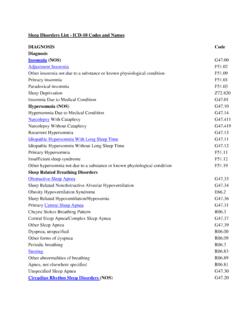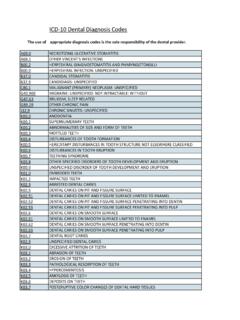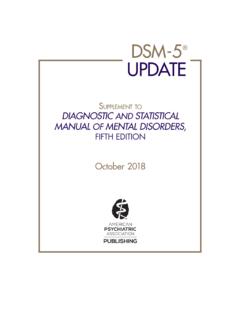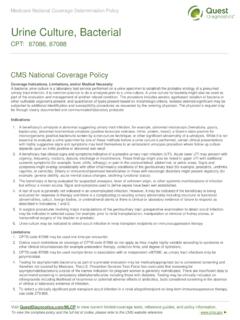Transcription of Lipid Testing - Quest Diagnostics
1 CPT:Medicare National Coverage Determination PolicyCMS National Coverage PolicyVisit view current limited coverage tests, reference guides, and policy view the complete policy and the full list of codes, please refer to the CMS website reference80061, 82465, 83700, 83701, 83704, 83718, 83721, 84478 Lipid TestingCoverage Indications, Limitations, and/or Medical NecessityLipoproteins are a class of heterogeneous particles of varying sizes and densities containing Lipid and protein. These lipoproteins include cholesterol esters and free cholesterol, triglycerides, phospholipids and A, C, and E apoproteins. Total cholesterol comprises all the cholesterol found in various that affect blood cholesterol levels include age, sex, body weight, diet, alcohol and tobacco use, exercise, genetic factors, family history, medications, menopausal status, the use of hormone replacement therapy, and chronic disorders such as hypothyroidism, obstructive liver disease, pancreatic disease (including diabetes), and kidney many individuals, an elevated blood cholesterol level constitutes an increased risk of developing coronary artery levels of total cholesterol and various fractions of cholesterol, especially low densitylipoprotein cholesterol (LDL -C) and high densitylipoprotein cholesterol (HDL-C)
2 Are useful in assessing and monitoring treatment for that risk in patients with cardiovascular and related diseases. Blood levels of the above cholesterol components including triglyceride have been separated into desirable, borderline and high-risk categories by the National Heart, Lung, and Blood Institute in their report in 1993. These categories form a useful basis forevaluation and treatment of patients with hyperlipidemia. Therapy to reduce these risk parameters includes diet, exercise and medication, and fat weight loss, which is particularly powerful when combined with diet and exercise. IndicationsThe medical community recognizes Lipid Testing as appropriate for evaluating atherosclerotic cardiovascular disease. Conditions in which Lipid Testing may be indicated include: Assessment of patients with atherosclerotic cardiovascular disease Evaluation of primary dyslipidemia Any form of atherosclerotic disease, or any disease leading to the formation of atherosclerotic disease Diagnostic evaluation of diseases associated with altered Lipid metabolism, such as.
3 Nephroticsyndrome, pancreatitis, hepatic disease, and hypo and hyperthyroidism Secondary dyslipidemia, including diabetes mellitus, disorders of gastrointestinal absorption, chronic renal failure Signs or symptoms of dyslipidemias, such as skin lesions As follow-up to the initial screen for coronary heart disease (total cholesterol + HDL cholesterol) when total cholesterol is determined to be high (>240 mg/dL), or borderline-high (200-240 mg/dL) plus two or more coronary heart disease risk factors, or an HDL cholesterol <35 monitor the progress of patients on anti- Lipid dietary management and pharmacologic therapy for the treatment of elevated blood Lipid disorders, total cholesterol, HDL cholesterol and LDL cholesterol may be used. Triglycerides may be obtained if this Lipid fraction is also elevated or if the patient is put on drugs (for example, thiazide diuretics, beta blockers, estrogens, glucocorticoids, and tamoxifen) which may raise the triglyceride monitoring long-term anti- Lipid dietary or pharmacologic therapy and when following patients with borderline high total or LDL cholesterol levels, it may be reasonable to perform the Lipid panel annually.
4 A Lipid panel at a yearly interval will usually be adequate while measurement of the serum total cholesterol or a measured LDL should suffice for interim visits if the patient does not have CPT:Medicare National Coverage Determination PolicyVisit view current limited coverage tests, reference guides, and policy view the complete policy and the full list of codes, please refer to the CMS website referenceCMS National Coverage Policy (continued)80061, 82465, 83700, 83701, 83704, 83718, 83721, 84478 Lipid TestingAny one component of the panel or a measured LDL may be reasonable and necessary up to six times the first year for monitoring dietary or pharmacologic therapy. More frequent total cholesterol HDL cholesterol, LDL cholesterol and triglyceride Testing may be indicated for marked elevations or for changes to anti- Lipid therapy due to inadequate initial patient response to dietary or pharmacologic therapy.
5 The LDL cholesterol or total cholesterol may be measured three times yearly after treatment goals have been or other quantitation of lipoproteins may be indicated if the patient has a primary disorder of lipoid January 1, 2005, the Medicare law expanded coverage to cardiovascular screening services. Several of the proceduresincluded in this NCD may be covered for screening purposes subject to specified frequencies. See 42 CFR and section 100, chapter 18, of the Claims Processing Manual, for a full description of this panel and hepatic panel Testing may be used for patients with severe psoriasis which has not responded to conventional therapy and for which the retinoid etretinatehas been prescribed and who have developed hyperlipidemia or hepatic toxicity.
6 Specific examples include erythrodermiaand generalized pustular type and psoriasis associated with arthritis. Routine screening and prophylactic Testing for Lipid disorder are not covered by Medicare. While Lipid screening may be medically appropriate, Medicare by statute does not payfor it. Lipid Testing in asymptomatic individuals is considered to bescreening regardless of the presence of other risk factors such as family history, tobacco use, a diagnosis is established, one or several specific tests are usually adequate for monitoring the course of the specific diagnoses (for example, other chest pain) alone do not support medical necessity of these monitoring long-term anti- Lipid dietary or pharmacologic therapy and when following patients with borderline high total or LDL cholesterol levels, it is reasonable to perform the Lipid panel annually.
7 A Lipid panel at a yearly interval will usually be adequate while measurement of the serum total cholesterol or a measured LDL should suffice for interim visits if the patient does not have one component of the panel or a measured LDL may be medically necessary up to six times the first year for monitoring dietary or pharmacologic therapy. More frequent total cholesterol HDL cholesterol, LDL cholesterol and triglyceride Testing may be indicated for marked elevations or for changes to anti- Lipid therapy due to inadequate initial patient response to dietary or pharmacologic therapy. The LDL cholesterol or total cholesterol may be measured three times yearly after treatment goals have been no dietary or pharmacological therapy is advised, monitoring is not evaluating non-specific chronic abnormalities of the liver (for example, elevations of transaminase, alkaline phosphatase, abnormal imaging studies, etc.)
8 , a Lipid panel would generally not be indicated more than twice per CPT:CodeDescriptionMedicare National Coverage Determination PolicyThe ICD10 codes listed below are the top diagnosis codes currently utilized by ordering physicians for the limited coverage test highlighted above that are also listed as medically supportive under Medicare s limited coverage policy. If you are ordering this test for diagnostic reasons that are not covered under Medicare policy, an Advance Beneficiary Notice form is required. *Note Bolded diagnoses below have the highest utilizationDisclaimer: This diagnosis code reference guide is provided as an aid to physicians and office staff in determining when an ABN (Advance Beneficiary Notice) is necessary. Diagnosis codes must be applicable to the patient s symptoms or conditions and must be consistent with documentation in the patient s medical record.
9 Quest Diagnostics does not recommend any diagnosis codes and will only submit diagnosis informationprovided to us by the ordering physician or his/her designated staff. The CPT codes provided are based on AMA guidelines and are for informational purposes only. CPT coding is the sole responsibility of the billing party. Please direct any questions regarding coding to the payer being updated:Visit view current limited coverage tests, reference guides, and policy view the complete policy and the full list of codes, please refer to the CMS website reference , Quest Diagnostics , any associated logos, and all associated Quest Diagnostics registered or unregistered trademarks are the property of Quest Diagnostics . All third-party marks and are the property of their respective owners.
10 2016 Quest Diagnostics Incorporated. All rights Otherspecified Hypothyroidism, Type 2 diabetes mellitus with diabetic chronic kidney Type 2 diabetes mellitus with Type 2 diabetes mellitus with other specified Type 2 diabetes mellitus with unspecified Type 2 diabetes mellitus without Obesity, Pure hypercholesterolemia, Pure Mixed Hyperlipidemia, unspecifiedI10 Essential (primary) Hypertensive heart disease without heart Hypertensive chronic kidney disease with stage 1 through stage 4 chronic kidney disease, or unspecified chronic kidney Atherosclerotic heart disease of native coronary artery without angina other specified abnormal findings of blood Abnormal finding of blood chemistry, other long term (current)
